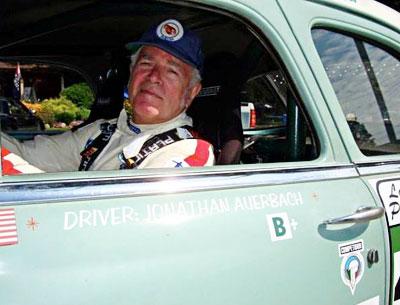Jonathan L. Auerbach

Jonathan L. Auerbach, a resident of and lover of all things Sagaponack for the past 20 years, died of cancer on Nov. 29 in New York City with his family by his side. He was 70 years old.
Mr. Auerbach, who was the founder and managing director of Auerbach Grayson and Company, which provides international securities research, execution, and settlement for United States institutions. He was also a dedicated supporter of the arts, serving in leadership roles at the Shakespeare Globe Center in the United States, as well as the Globe Center in London, which he helped found.
He produced the underground film “Vortex,” which was selected for the New York Film Festival, among others, and appeared in the film “Belladonna,” which premiered at a Whitney Biennale.
A man of wide-ranging interests, he loved vintage car road rallies, as well. In 2000 he became involved in the Bridgehampton Road Rally. This May, he took part in the Trans-America Rally, which covers the over 4,000 miles between New York City and Vancouver, British Columbia. He made the trek with his son Jake Auerbach acting as navigator, crossing the country in a 1951 Chrysler New Yorker. He also participated in the New Jersey Vintage Grand Prix and the Mount Washington Climb to the Clouds, among other rallies and motoring events.
Born in Philadelphia on Nov. 25, 1942, he graduated from the Noble and Greenough School, a boarding school in Dedham, Mass. He went on to Yale University, where he was a member of the R.O.T.C., and served in the Army as a first lieutenant after his graduation in 1964.
He began his career in international securities trading and marketing in the 1970s and founded his own firm in 1993. He had a deep interest in the developing world, particularly in Africa. He traveled the continent, not just as a businessman but as a humanitarian.
In 2003, according to an article published the Noble and Greenough School, he met Wangari Maathai, who ended up winning the 2004 Nobel Peace Prize. That meeting led him to support a reforestation project in Kenya through the Green Belt Movement, which Ms. Maathai had herself become involved with in the 1970s. The Green Belt Movement is an environmental organization that empowers communities, particularly focusing on women, to conserve the environment and improve their lives.
Ms. Maathai spoke to Mr. Auerbach’s alma mater in 2008, and said, “Be appreciative of nature. There is a lot about nature you don’t see and don’t understand, but you should nevertheless appreciate it.”º
Mr. Auerbach set up a scholarship at Noble and Greennough, to provide assistance for students primarily from emerging markets.
He also was a trustee of the Dwight School in New York City.
Mr. Auerbach split his time between Sagaponack and New York City, and had been planning before his death to move to Sagaponack full time.
He was a member of the Peconic Land Trust and was a supporter of the Hampton Library in Bridgehampton, along with his wife of 23 years, Anne Luce, who survives.
In addition to his wife, he is survived by his children, Gabrielle, Jake, Nick, and Sasha Auerbach, all of New York City, as well as his father, Joseph Auerbach, who lives in Boston, and a sister, Hope Pym of Kent, England.
His mother, Judith Auerbach, and a son, Patrick Luce Auerbach, died before him.
Mr. Auerbach was buried at Edgewood Cemetery in Bridgehampton.
The family is planning for a memorial service in the new year.
Harry Gilbert Carlson
Harry Gilbert Carlson, an expert in the literature of William Shakespeare and Henrik Ibsen, died on Saturday at Stony Brook University Medical Center of complications from an infection. He was 82.
A funeral service will be held tomorrow at 10 a.m. at St. Michael’s Lutheran Church in Amagansett.
He was a professor emeritus at Queens College in the department of drama and theater, and was the author of “Out of Inferno: Strindberg’s Reawakening as an Artist,” published in 1996, and “Strindberg and the Poetry of Myth,” published in 1982. He was awarded a Guggenheim fellowship in 1966.
According to Richard Gambino, a member of a coterie of Shakespeare enthusiasts, a typical evening involved gathering around a piece of audio-visual equipment to watch Shakespearean productions Mr. Carlson had recorded from films and videotapes. Discussions followed.
It all started with a small TV on the top floor of a house in East Hampton. Mr. Carlson’s collection included about 2,000 DVDs of plays by Ibsen and Shakespeare. In recent years, the group met on Saturday mornings at the Amagansett Library.
Mr. Carlson was born in 1930, the son of Harry C. Carlson and the former Bertha A. Johnson. His parents were immigrants from Sweden. He lived in East Hampton for many years in a house built by his father, a carpenter. Mr. Carlson is survived by his wife, Carolyn, who has advanced Alzheimer’s disease.
During the Korean War, Mr. Carlson served in the Army. He asked to be discharged in South Korea so he could teach Shakespeare to Korean college students. Mr. Gambino said Mr. Carlson told the story of the time he was reading a passage from a Shakespeare play to illustrate the universality of the playwright’s insights and noticed that his students were nodding their heads. He asked why. One of them answered, “Shakespeare must have been a Buddhist.”
He went on to teach Ibsen’s and Shakespeare’s works in Europe and the U.S. He also served as a director, producer, and sometime actor in a great many productions for the rest of his life.
Mr. Gambino wrote: “The opinions universal among those many who knew Harry Carlson on hearing of his death are all so many variations on: ‘Now cracks a noble heart. Good night, sweet prince; and flights of angels sing thee to thy rest.’ ”
